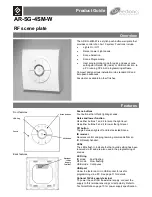
Section 2. File Formats
This section covers the different types of files stored on the CF card
2.1 Data Files
The datalogger stores data on the CF card in TOB3 Format. TOB3 is a binary
format that incorporates features to improve reliability of the CF cards. TOB3
allows the accurate determination of each record’s time without the space
required for individual time stamps.
TOB3 format is different than the data file formats created when data are
collected via a communications link. Data files read directly from the CF card
generally need to be converted into another format to be used
When TOB3 files are converted to another format, the number of records may
be slightly greater or less than the number requested in the data table
declaration. There is always some additional memory allocated. When the file
is converted this will result in additional records if no lapses occurred. If more
lapses occur than were anticipated, there may be fewer records in the file than
were allocated.
The CardConvert software included in LoggerNet, PC400, and PC200 will
convert data files from one format to another.
2.2 Program Files
The CF card can be used to provide extra program storage space for the
datalogger. Program files can be copied to the card while it is attached as a
drive on the computer. They can also be sent to the card using LoggerNet’s
File Control. They may also be copied from CPU memory to the card (or from
the card to CPU memory) using the keyboard display.
2.3 Power-up Files (powerup.ini)
Users can insert a properly-configured CF card into the CFM100, cycle
through the datalogger power, and have power up functions automatically
performed.
Power-up functions of CompactFlash(R) cards can include
a)
Sending programs to the CR1000 or CR3000
b)
Setting attributes of datalogger program files
c)
Setting disposition of old CF files
d)
Sending an OS to the CR1000 or CR3000
e)
Formatting memory drives
f)
Deleting data files
2-1











































